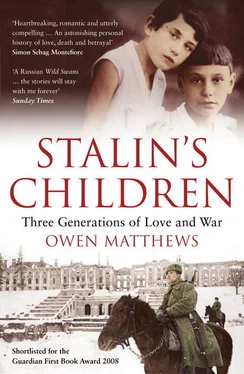Bibikov made sure his family knew nothing. Lenina’s memory of those years in Kharkov is of bazaars filled with fruits and vegetables, and her father coming home laden with sausages from the factory’s canteen and boxes of sweets for the children. She doesn’t remember wanting for anything. What did Bibikov think, as he tucked those paper-wrapped sausages into his briefcase as dusk fell, bringing the night and its crop of starved and desperate wanderers? He thought, I am quite sure, thank God it’s them, instead of us.
The convulsions of collectivization two years previously could be explained away as a war against the Revolution’s class enemies, the kulaks. But now those enemies had been liquidated and the collective farms of the future established. Yet even those blinded by ideology could scarcely fail to see that the Workers’ and Peasants’ State was, painfully obviously, failing to feed its own people. Moreover, for all the glorious achievements of industrialization, it was equally clear that the whole dream of Socialism was being held together increasingly by coercion. Already in October 1930 a law forbade the free movement of labour, tying peasants to their land and workers to their factories, as in the days of serfdom. In December 1932 internal passports were introduced in an effort to stem the exodus of the starving into the cities.
Does Bibikov’s decision to continue believing, in the face of mounting evidence that the dream was becoming a nightmare, make him a cynical man? It’s hard to know, since first and foremost he had little choice but to follow the Party line. The alternative was to join the starving, or worse. Yet he was clearly intelligent enough to understand that terrible cracks were appearing in the paradise he had spent his adult life fighting for.
Perhaps, like many of his generation, he convinced himself of that greatest of twentieth-century heresies: that bourgeois sentimentality had no place in the heart of a servant of a higher humanity. Maybe he believed that the Party would ultimately create a brave new world from all this chaos. Or perhaps, less self-righteously, he convinced himself that his duty was to do what he could to conquer the backwardness of Russia, with its famines and grinding poverty, by helping to forge it into a modern, industrial nation. Most likely, though, is a more human explanation: it was much easier to live by one’s myths, and to continue to believe in the ultimate wisdom of the Party, than to speak out and risk disaster.
Yet the famine-ravaged country Bibikov saw during the winter of 1931-32 seems to have profoundly altered him. The Party was always right, yes – but the Party’s tactics might at least be altered. Like many Party leaders in the Ukraine who had seen the horrors which Stalin’s hard line produced first hand, Bibikov became convinced that Stalin’s rule must be softened if further disaster was to be averted. His chance to speak out came eighteen months later, shortly before the birth of his second daughter, my mother, Lyudmila Borisovna Bibikova.
It was a long time ago, and it never happened.
Yevgeniya Ginzburg
In the first days of January 1934 Bibikov left his heavily pregnant wife at home and travelled with several senior factory managers by special train to Moscow to attend the Seventeenth All-Union Party Congress as an ex officio observer. Because he never discussed politics with Martha, she had no idea that her husband had determined on an act of defiance which was to cost him his life.
The meeting was billed as the ‘Congress of Victors’, a celebration of the victory of collectivization, the triumphant fulfilment of the first Five Year Plan and the consolidation of the Revolution. But despite the official encomiums to the success of the Party, there was widespread exhaustion among the rank and file. Bibikov, like many, felt strongly that the famine which still continued over much of southern Russia had to be brought to an end. The Five Year Plan had been fulfilled, but the men and women of the grass roots who were more managers than ideologues saw with their own eyes that the insane pace of change couldn’t be sustained. Yet Stalin, the desk-bound firebrand, called for greater production, higher yields, and more vigour in pursuing collectivization despite its manifestly disastrous consequences.
There was no open dissent at the congress. But there was talk of easing Stalin out of the position of power he had forged from the hitherto insignificant post of General Secretary and replacing him with the more moderate Sergei Kirov. Kirov, the secretary of the Leningrad Party, was, at that point, still more than a match for Stalin. He was a Civil War hero, a former close ally of Lenin and the greatest orator the Party had seen since Trotsky.
Bibikov, along with many of his colleagues from the Ukraine, was encouraged by an apparent spirit of openness, a sense that there was to be a robust ideological debate among equals over the future of the great experiment they were building together, and they wholeheartedly backed Kirov’s plan to slacken the pace. It proved to be a fatal mistake. In Stalin’s already paranoid mind, Kirov’s attempt to soften the punishing pace of collectivization was an unpardonable insult and challenge to his ideological leadership of the Revolution. Stalin did not forget who voted and how, though his revenge was four years in the making. Of the 1,966 delegates to the Seventeenth Congress, 1,108 were to die in the Purges. The conference ended with the now customary standing ovations and exhortations to even greater triumphs in the future. Bibikov stood and applauded Stalin and the Politburo with the rest. But the outcome was politically inconclusive. Kirov had refused openly to challenge Stalin. Yet it was equally clear that Stalin was not yet undisputed master of the Party. The supposedly open debate over the Party’s future was not to be repeated until Mikhail Gorbachev’s time, when dissent was to rip the Party apart for ever.
Bibikov’s second daughter, Lyudmila, was born on 27 January 1934, just after her father’s return from the Congress.
Though he named his elder daughter after Lenin, he pointedly did not name his second, as some sycophants were already beginning to do, Stalina.
* * *
The year passed in furious work on the factory, with no sign of the political apocalypse which Stalin was quietly plotting. But on the evening of 2 December 1934, Lenina remembers that her father came home from work in tears. He threw himself on to the leather sofa in the sitting room and stayed there motionless for a long time, his head in his hands.
‘My propali,’ Bibikov said quietly to his wife. ‘We are lost.’
Lenina asked her mother what was wrong. Martha didn’t answer and sent her to bed.
The previous night Sergei Kirov had been shot dead by a lone assassin in his office at the Party headquarters at the Smolny Institute in Leningrad. ‘We are lost,’ Bibikov said as he wept for the death of a man he admired. But was he also weeping for himself? Weeping with anger for the mistake he had made in identifying himself too closely with the losing side? For all his cultivated proletarian bluffness, Bibikov must have been a political animal, a committee man, with a rising star’s sense of the way the wind was blowing. As Bibikov lay on the sofa weeping for Kirov, he must have turned over those now-dangerous January conversations in his mind, wondering whether he had said too much.
And yet the hammer did not fall at once. Stalin, too, wept in public at Kirov’s funeral, and acted as chief pallbearer, leading the nation in mourning. There was time enough to take revenge on the enemies in the heart of the Party which Stalin had identified at the congress.
Читать дальше











